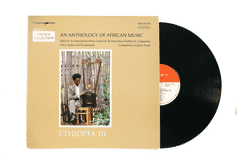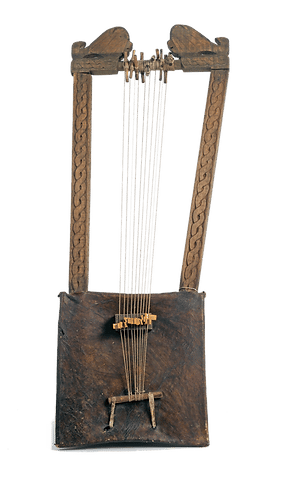Presented by Museum of the Peace Corps Experience and American University Museum
Ethiopia: Three Chordophone Traditions, An Anthology of African Music series, UNESCO Collection, France, 1985
Recorded by Cynthia Tse Kimberlin in Addis Ababa, Ethiopia, 1972
Vinyl, 12 1/4 x 12 1/4 in.
Collection, Museum of the Peace Corps Experience
Gift of Cynthia Tse Kimberlin, Ethiopia, Mendefera 1962–64

I was a member of the first Peace Corps group to Ethiopia—and the first American woman of Chinese descent to serve as a volunteer. I was first assigned to Mendefera. The name Mendefera derives from the high hill in the center of the town and means “no one dared.” For the town’s inhabitants, it is a reminder of the resistance by the local people against colonization. I taught science at St. George Middle School and, after school, English to working adults.
During our two-month summer leave, a number of volunteers decided to visit South Africa. A good friend of mine was delegated to inform me that I could not travel with them because of South Africa’s apartheid policy. Of all the moments when I was reminded of my unique status, this blatant racism was the hardest to bear. I simply could not believe such discrimination actually existed, nor could I understand why my Peace Corps colleagues would want to visit South Africa when they knew other Americans could not.
I spent my leave in Egypt where the sun shines all day. I didn’t realize my skin color had changed to a dark copper brown until I returned to my classroom in Asmara. My students beamed with amazement and shouted something that startled me: “You’re brown like us!”
Music from Eritrea was unlike anything I ever heard. It captivated my attention and imagination so much that I set about recording it. This foreshadowed my future career as an ethnomusicologist.
In 2000 I took the Tigrinya songs I recorded back to Addis Ababa, Ethiopia, and played them to some young people I met. They did not know these songs, but some of their parents and grandparents did. The songs were not familiar to them due to the political turmoil from 1974 to 1991, following Haile Selassie’s removal in a military coup. The military regime that replaced the emperor banned love ballads, religious songs, and musical instruments associated with religion.
The ban prompted me to publish some of my 1972 field recordings of prerevolutionary music, resulting in the 1985 UNESCO recording Three Chordophone Traditions. After 1991 the ban was lifted.
This music is an historical document of an oral tradition. One could say I am returning these songs to the people who first gave them to me, whom I still feel privileged to know. I hope that the next generation will enjoy these songs and pass them on.
Baganna
Mid-twentieth century
Eritrea, Ethiopia
Wood, animal string, hide,
43 1/2 x 17 x 10 in.
Collection, Museum of the Peace Corps Experience
Gift of Cynthia Tse Kimberlin, Ethiopia, Mendefera 1962–64

Museum of the Peace Corps Experience
PO Box 2427
Oregon City, OR 97045
USA
The Committee for a Museum of the Peace Corps Experience is a 501(c)(3) private nonprofit organization. Tax ID: EIN # 93-1289853
The Museum is not affiliated with the U.S. Peace Corps and not acting on behalf of the U.S. Peace Corps.
Museum of the Peace Corps Experience © 2024. All Rights Reserved.